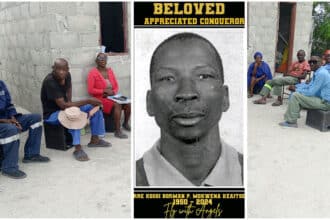Widow goes blind after lengthy wait to remove cataracts
Around 300 people in and around Maun are in danger of going blind as they wait their turn for surgical treatment at Letsholathebe II Memorial Hospital.
Sources from the government-owned hospital suggest the institute’s theatre is in a terrible state and thus operations have not been carried out ‘in a long time’.
“It is bad. The ceiling is falling and the rainy season has made matters worse. No surgeon in their sane mind can perform surgery under such an unhygienic environment,” claimed an insider.
It is believed hundreds of eye patients are on the ever-lengthening waiting list at the hospital’s eye clinic, desperately hoping to be seen by the region’s sole ophthalmologist.
Because of the dilapidated condition of the hospital building, which officially opened its doors in September 2008, it is a wait that looks set to rumble on.
For 63-year-old Lucky Keemetsekgosi, it is a wait that has cost him his sight.
“They kept postponing my appointments with the doctor until I went completely blind,” revealed the widower, whose blindness is caused by cataracts.
His vision can be restored if he ever receives the surgery he needs. Until then, he remains totally reliant on his three daughters, after his wife passed away last year.
Keemetsekgosi told The Voice he was referred to the hospital in 2019, while he could still see.
However, his appointments were repeatedly postponed, during which time his sight gradually deteriorated. By December 2020, he was totally blind.
“The eye that gave me problems at first was my left one. By then it had partial sight and I went to the hospital on my own. The doctor made an appointment for me to come for operation because the diagnosis was that cataract was covering my eye and another one building up on the other eye,” explained the elder, becoming increasingly agitated as he narrates his tale of woe.
Following numerous visits and cancellations, Keemetsekgosi was informed he would be contacted through the local clinic in Komana village once the ophthalmologist was available.
“I went to the clinic as told. So many trips did I make that I realised I am troubling the nurses this side. Every time I get to the clinic the nurse will call Letsholathebe and they will always give us the same answer that the eye doctor is not yet available. This happened until both my eyes went blind! Now I am just sitting at home hoping they will one day make that call.”
Poverty has also hampered the old man’s hopes at regaining his sight.
“If I had money, I would go to Serowe because I have heard that there is another eye doctor there who can assist.”
Indeed, Keemetsekgosi, who used to make a living through agriculture, rearing small stock and occasionally working for government’s drought relief programme, Ipelegeng, says the blindness has basically reduced him to a pauper.
“Life is very hard these days, I don’t even know what is happening to my livestock. I am told that next week government will be buying goats from farmers and I am afraid I will be left out, worse still some may steal my goats and sell them,” grumbled the visibly frustrated Keemetsekgosi.
Terrified she may suffer a similar fate, 27-year-old Abigail Semadi says she lives in constant fear that she may one day go blind if she does not get help soon.
Semadi, who resides in the same village as Kemmetsekgosi, was referred to the hospital in January after experiencing similar symptoms to the old man.
Her appointment has been set for August.
“It is very depressing because at the end of this waiting period, they may postpone and give me new dates because that is what others have been going through,” she notes nervously.
Eye care remains one of the greatest public health challenges in Botswana. The acute shortage of specialists means for Keemetsekgosi and countless others, treatment remains a high dangling fruit often just out of reach.
Meanwhile, Letsholathebe’s Public Relation’s Officer (PRO), Batisani Mokgethi admits the hospital’s theatre is in a bad way.

“The roof is leaking and therefore it sometimes gets wet in there so surgeries have to be postponed for hygienical purpose. Further the same theatre is shared by other doctors, for instance maternity and others.”
Mokgethi admitted that indeed a waiting list for the eye clinic may reach around 350, but insisted the hospital is unaware of any patient going blind while waiting for surgery.
“We have just three ophthalmologists in the country, one here in Maun, another in Serowe and one in Molepolole so you can see the challenge. But there was a point last year when we did not have one so some of the cases were referred to Serowe.”
In June 2019, charity organisation, Combat Blindness International, reported to have eradicated a backlog of 6, 000 cases of blindness caused by cataracts in Botswana. Some of the patients had waited for three years before getting the 20-minute operation that restored their sight.
A cataract, according to scientific explanations, is a cloudy area in the lens of an eye that leads to a decrease in vision. Symptoms may include faded colours, blurry or double vision, halos around light, trouble with bright lights and trouble seeing at night.





